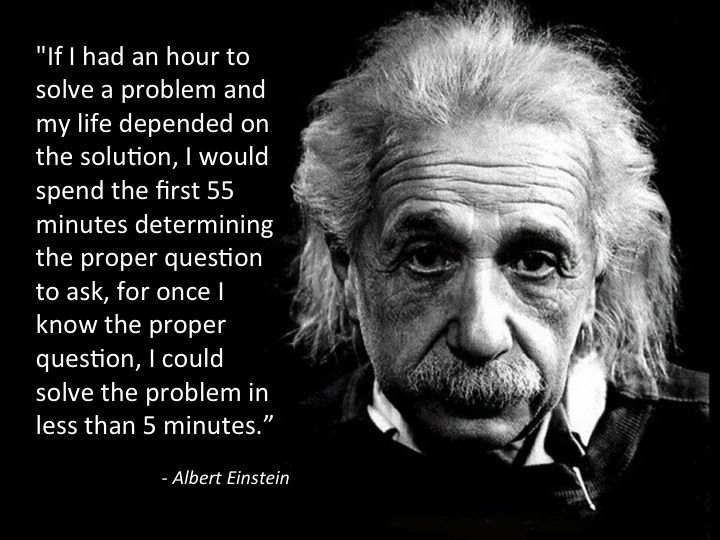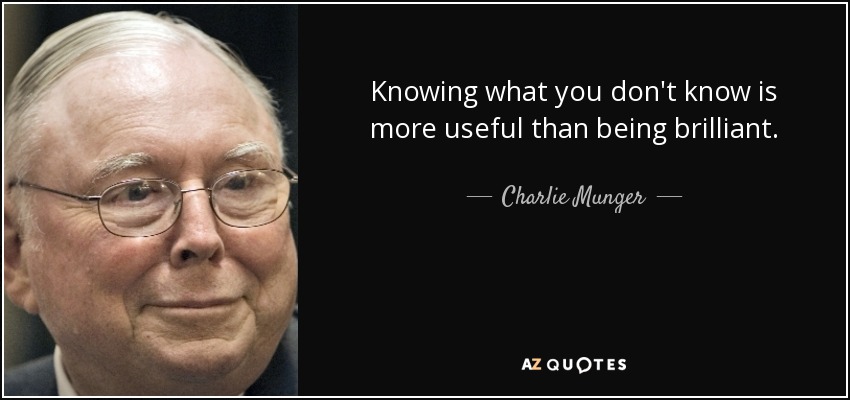Change Questions To Change Your Outcomes
Asking The Right Questions Is Critical For A Successful Change
Why Are Change Questions So Important?
Every time we initiate a significant change - whether in our personal life or in an organisation - we will most likely over-estimate our chances of a successful outcome and under-estimate the likelihood that things will not work out as we had planned.
Why is this?
In my experience, there are 2 reasons for this:
[1] We live in an interconnected and extremely complex world.
- The world contains innumerable moving parts that are subject to a randomness that is hard to predict.
- On occasions, this randomness can lead to extreme outcomes.
- Success is the exception rather than the rule.
- Failure is the norm.
[2] We are ill-equipped to initiate major change.
- We are hardwired to look for short cuts.
- This, together with our cognitive biases,
leads us to conclusions that tell us what we want to hear.
- We should never underestimate our capacity for self-deception and our lack of understanding of reality.
A major focus of this site is on thinking skills and if you strip that down to the basics, this is all about asking the right questions.
This article is part of a series on the art of persuasion, communication and change based on my 45 years in business, and I going to share with you a framework of questions that will enable you to handle any significant change.
I can not guarantee that you will succeed - but if you apply this model and ask these questions you will improve your judgement and be better equipped to learn and improve from your experiences however it plays out.
Fundamental Change Questions
Before proceeding with any significant change, you need to be very clear about these 4 points:
- Why do you need to make the change?
- What are the specifics of the change?
- How do you expect to benefit from the change?
- Who will experience the impacts of this change?
We then expand on these points and apply this template which considers key aspects in the planning of any significant change in your personal life or in an organisation:
CHANGE QUESTIONS
Blueprint Benefits Impacts Communications Risks Steps
Recommended reading:
Asking The Right Questions - How To Avoid Wonky Thinking
Blueprint For Change
A blueprint is a clear description of how your life or your organisation is going to
look after you have implemented your proposed change.
It is important that you have clarity about this for two reasons:
- It causes you to define and describe out how your life, or organisation, will be different after the change.
- It enables you to communicate and discuss with those who are involved with the change and who will be impacted by it.
Ask yourself:
- How will it be different?
- Where will it be different?
- Why will it be different?
- When will it be different?
Example:
Some years ago I was offered a job in Singapore. The role was as deputy CEO of an owner-managed chain of spas. My mission - if I chose to accept it - was to improve the profitability of the business with a view to rolling out a franchise across India and then undertaking a listing on the Indian stock exchange.
If I accepted this job it would have meant a very different life for me and my partner.
The financial upside was huge. But, aside from the major cultural changes of working in Singapore, the reality of working overseas for a number of years represented a major lifestyle change for both of us.
In considering this job offer I applied the change questions outlined in this article.
The one aspect that bothered me most was that I had run my own companies for many years and the idea of working for someone else, and especially an owner-manager, was not very attractive.
I decided to reframe the opportunity and expand my blueprint and look at the bigger picture.
I figured that regardless of how this job worked out, it would give me an opportunity to make an enormous change and establish myself in Singapore and South East Asia, at someone else's expense, and if necessary I would be far better placed to find alternative opportunites.
Benefits Of Change

The benefits of your proposed change are the raison d'etre, the whole point and purpose, for your proposed change.
For each anticipated benefit you need to know the following:
- Description - what precisely is the benefit?
- Capabilities - what will this benefit make possible for you to do?
- Measurement - how will it be measured?
- Dependencies – what will it depend on?
- Timescales
– over what period of time will it occur?
Example:
The primary benefit of this job offer was the potential for long term financial security for my family and a capital based to finance other business opportunities.
This was a financial benefit that would be measured in salary, bonuses and share options.
The major dependencies were:
- The owner of this business and my relationship with him.
- His prepardedness to handover the running of the business to me.
- The validity of the assumptions on which his business plan were based.
- What to me were the many "unknown unknowns".
The timescale for the bigger benefit of share-options was approximately 3-4 years.
The secondary benefit of establishing myself in Singapore and South East Asia were almost a given provided I managed to stay out there for a least a few months.
Impacts Of Change

This is when the full impacts - positive and negative - need to be thought through and explored carefully and all potential people issues examined.
This is about the
management of expectations and the emotional transitions, that those affected by the change will experience, as they come to terms with the impacts of your proposed change.
- Who is your proposed change going to affect?
- What will they lose?
- What will they gain?
- How will it affect them?
- How will they react?
Example:
This proposed change impacted my partner directly and my grown up children and my parents less so.
For my partner the main loss was not having me around so much - but given that a lot of my career had been spent travelling, this would require an adjustment but more to the periods of my being away being longer rather than the fact of me being away.
The potential gains were large as I have described.
My partner reacted positively to this potential opportunity. She had travelled extensively and saw this as an opportunity for her to spend more time travelling.
With my children and parents we all decided that the impact of my working away would be considerably lessened if I came back regularly for short breaks and spent time with them every quarter.
Communicating Change
This is where you figure how to communicate with those people who will be impacted by the change, and to do so in a way that enables them to accept it and be able to support you in it.
Often this is where the disconnects can occur between you as make the change and those who will be impacted by the change.
Good communication is critical.
The bigger the change there is going to be then the greater the need for effective communication about the reasons for the change, how it will look after the change, and the benefits of the change.
5 guiding principles of a good change management communication strategy
- Clarity of message - to ensure relevance and recognition
- Resonance of message - the emotional tone and delivery of the message
- Accurate targeting - to reach the right people with the right message
- Timing schedule - to achieve timely targeting of messages
- Feedback process - to ensure genuine two way communication
The key questions that your communication needs to address:
- Who are you trying to reach?
- What are your objectives?
- What are the key messages?
- What information will be communicated and to what level of detail?
- In terms of timing and frequency, when will you communicate?
- What means and media will be used to communicate?
- How will you invite, and respond to, feedback?
Example:
Communicating with the various members of my family was not that complicated.
With my children and parents, the level and nature of contact would remain very similar to what it already was via email and Skype [back then] and alternative low cost messaging services.
The nature of our communications would remain similar to what it already was.
With my partner we agreed that we would talk 2 or 3 times.
We also agreed that as she was a major stakeholder in this venture I would update her regularly as to how the new role was developing.
Risks of Change

It is very important that you pay careful attention to the risks that you will face as you move forward with your proposed change.
You will also want to give careful thought as to how you can mitigate those risks.
I stress this because the natural tendency is to underestimate risks and to be fuelled and buoyed by optimisn and a positive expectation of success.
In an earlier article I outlined a simple structured process for identifying issues associated with each major task in implementing your proposed change.
This process will identfy some of the risks you will face, but you also need to take this a stage further and examines risk in terms of the:
- Where might these risks occur?
- What assumptions have you made that may not prove solid?
- What dependencies [on people, processes and events] are you relying on?
- What could wrong?
- What is the likelihood?
- What impact will this have?
- How can you reduce the impact and mitigate the risks you have identified?
Example:
Based on my past experience I knew that the biggest risk to this proposed venture would be the owner of the business.
Owners find it hard - if not impossible - to let go and hand over control of the operational management of their business. So I was prepared for this risk.
The dependency was the owner and likelihood of this issue arising was high.
I tried not to make to make too many assumptions, but in these situations there are limits as to how much due diligence you can do.
So I was also prepared for the franchise rollout to not be entirely straight-forward and, as with the issue of the owner letting go, I decided to deal with these things as and when they arose.
I also knew that there would unknown issues and I would just have to deal with them as they arose.
Footnote:
In case you are wondering how this all worked out - I did take the job and it didn't work out!
The owner could not let go and was a nightmare to work with.
The killer issue [unknown to me at the outset] was that he had taken on a major investor prior to my arrival and he had a very fractious and contentious relationship with this investor which rapidly resulted in litigation and the termination of his expansion plans.
I parted company with this owner after 4 months and applied my backup plan and secured a job with a regional management consultancy in Singapore which developed into the establishment of a new business focused on commodities and of which I am still the CEO.
The application of these change questions and the structured approach to the initial opportunity paid off!
Steps to Change
This is the point at which you identify the steps you have to take to implement your proposed change and to successfully realise the benefits.
Your first big decision is the “Business as Usual” test as you ask yourself:
- Is this an Incremental Change or a Step Change?
An incremental change is one that you can handle within business as usual. But if, as is likely, this is a step change then you will need to adopt a more carefully thought through approach:
- Do you have all the skills and experience you need to make this change or do you need to recruit some outside assistance?
-
Have you identified the issues and impacts that will arise with each key task in implementing your proposed change?
- Have you set out in a logical way the things you need to get right in order to get the desired result?
Recommended reading:
Getting From A to B Is Not Aways A Straight Line?
Further Reading:
Persuasion
[1] The Art Of Persuasion The One Fundamental Principle - Create A Win-Win
[2] The Art Of Persuasion Advanced Communication Skills - Gaining BuyIn
[3] The Art Of Persuasion Planning For Success - Here's How To Do It!
Change
Getting From A to B Is Not Aways A Straight Line
Group Culture - The Invisible Software That Rules Your Life
Change Questions To Change Your Outcomes
Communication
How To Influence without Authority - 6 Key Tips
Situational Communication - Different Strokes For Different Folks
Return from "Change Questions" to: Communication Persuasion and Change
Or to: Walking The Talk
- What if everything we think…
LATEST ARTICLES
The Power Of Patience - Why You Need The World's Toughest Quality
 Nothing in the world can take the place of patience. Patience and persistence are omnipotent. In everyday life, patience is often overshadowed by the desire for immediate results. We live in an era of…
Nothing in the world can take the place of patience. Patience and persistence are omnipotent. In everyday life, patience is often overshadowed by the desire for immediate results. We live in an era of…Demonizing The Other and Personal Acts Of Compassion
 What Does Demonizing The Other Mean? Demonizing the other refers to the act of portraying a group of people or an individual as inherently evil, threatening, or inferior. It often serves to justify di…
What Does Demonizing The Other Mean? Demonizing the other refers to the act of portraying a group of people or an individual as inherently evil, threatening, or inferior. It often serves to justify di…Why You Should Embrace Anomalies - The Incredible Value Of Disconfirming Evidence
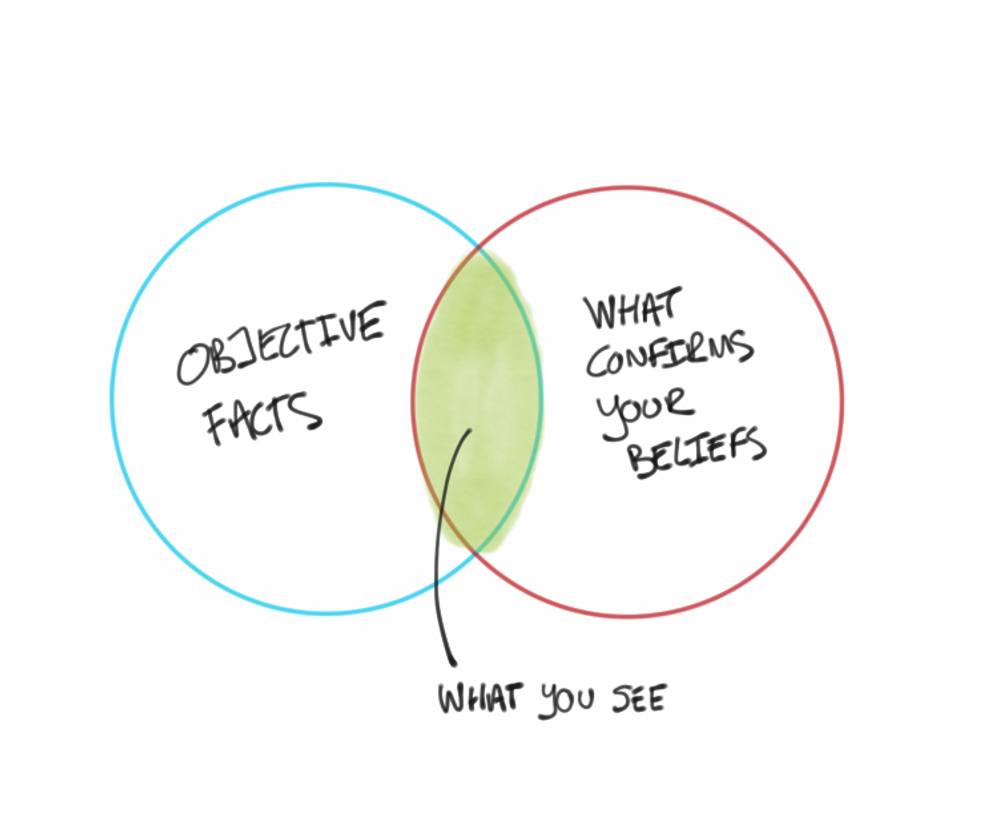 Is Your Desire To Be Right Greater Than Your Desire To Have Been Right? An anomaly is a deviation from what is expected or commonly regarded as the norm. It often appears as an unexpected observation…
Is Your Desire To Be Right Greater Than Your Desire To Have Been Right? An anomaly is a deviation from what is expected or commonly regarded as the norm. It often appears as an unexpected observation…Amazing Grace - The Majesty And The Mercy of Freedom From Your Pain
 "I once was lost, but now I am found, was blind, but now I see." The hymn and popular song "Amazing Grace" was written 250 years ago by John Newton, a former slave trader who in 1748 nearly died in a…
"I once was lost, but now I am found, was blind, but now I see." The hymn and popular song "Amazing Grace" was written 250 years ago by John Newton, a former slave trader who in 1748 nearly died in a…The Transformative Power Of Acceptance
 Experience The Power Of Acceptance. This website contains about 500,000 words. You could read every single word and it wouldn't make any real difference to you. You might become better informed, but t…
Experience The Power Of Acceptance. This website contains about 500,000 words. You could read every single word and it wouldn't make any real difference to you. You might become better informed, but t…Inversion - The Power Of Opposite Thinking
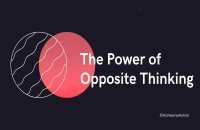 How To Avoid The Unwanted Outcome. The power of opposite thinking, also known as inversion, lies in its ability to stimulate creativity, enhance problem-solving, and provide a fresh perspective on cha…
How To Avoid The Unwanted Outcome. The power of opposite thinking, also known as inversion, lies in its ability to stimulate creativity, enhance problem-solving, and provide a fresh perspective on cha…Are You Aligned With Reality? Or Do You See What You Believe?
 We tend to see that which aligns with what we believe, and to act upon that rather than acting on reality. Being aligned with reality starts with a clear and accurate understanding of the world. It me…
We tend to see that which aligns with what we believe, and to act upon that rather than acting on reality. Being aligned with reality starts with a clear and accurate understanding of the world. It me…The Law Of Response and Outcome
 A New Approach To A New Life At time of writing we are entering a new year which is traditionally a time of making resolutions to change our behaviour and improve the quality of our lives. And yet pow…
A New Approach To A New Life At time of writing we are entering a new year which is traditionally a time of making resolutions to change our behaviour and improve the quality of our lives. And yet pow…Clear Thinking - Turning Ordinary Moments Into Extraordinary Results
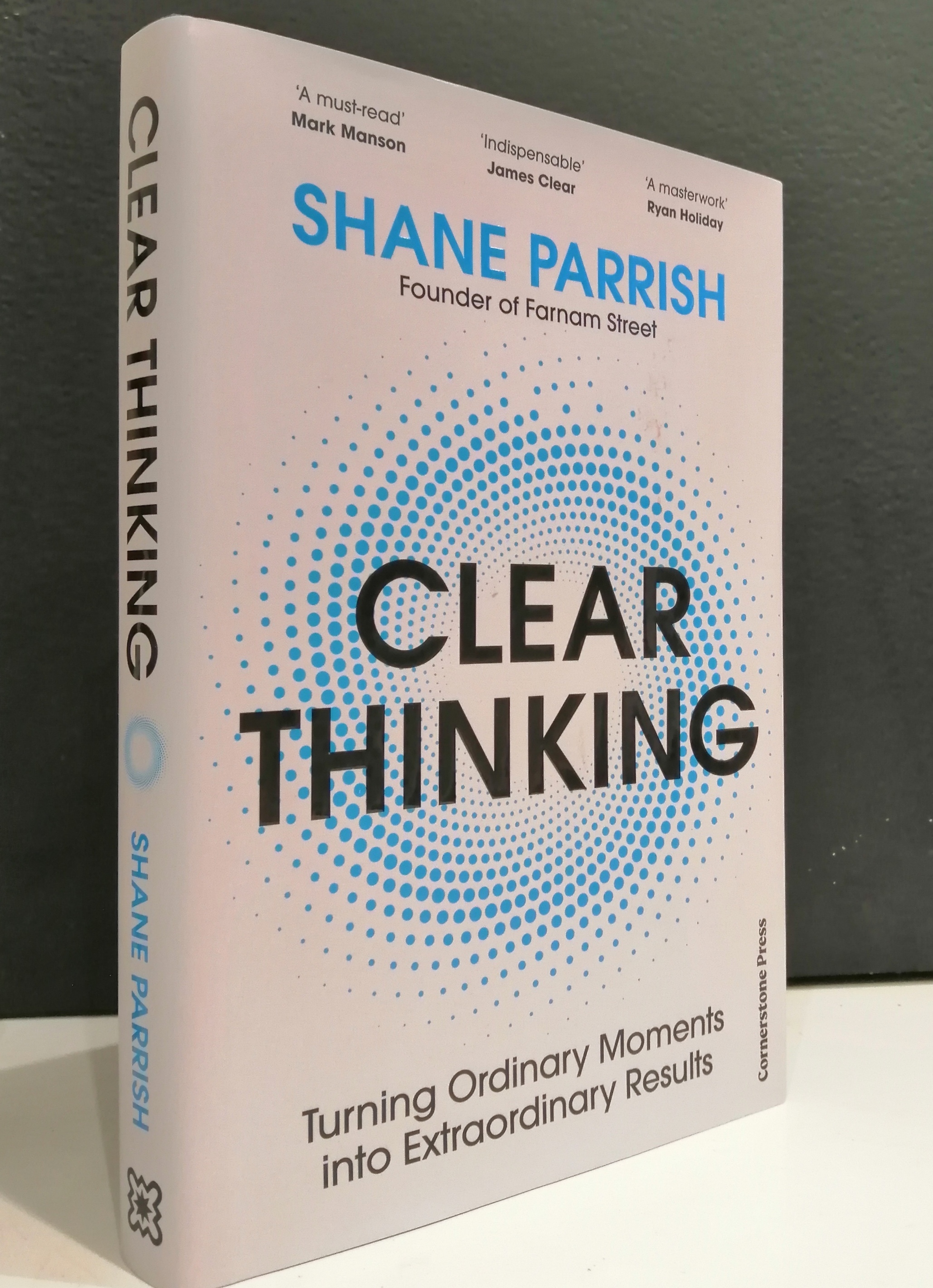 There are two ways to handle the world - try to predict, or try to prepare. "Clear Thinking" by Shane Parrish, published in Oct 2023, is a laudable testament to the art of cogent thinking, and will be…
There are two ways to handle the world - try to predict, or try to prepare. "Clear Thinking" by Shane Parrish, published in Oct 2023, is a laudable testament to the art of cogent thinking, and will be…Self Dialogue - Working With Your Many Selves
 Self Dialogue Is About Working With ALL Levels Of Your Mind. The key to effective self dialogue is to have tools, techniques and resources that work with all levels of your mind. This simple self-faci…
Self Dialogue Is About Working With ALL Levels Of Your Mind. The key to effective self dialogue is to have tools, techniques and resources that work with all levels of your mind. This simple self-faci…The Balanced Brain - The Ultimate Route To Personal Transformation
 How To Experience The Benefits Of A Balanced Brain. Underpinning all of the belief systems and practices that offer routes to personal change, transformation and spiritual growth is the balanced brain…
How To Experience The Benefits Of A Balanced Brain. Underpinning all of the belief systems and practices that offer routes to personal change, transformation and spiritual growth is the balanced brain…How To Make Better Decisions - By Avoiding The Narrative Trap
 To Understand The Truth We Have To See The Whole Picture. One of the best ways to make better decisions is to have a deeper understanding of the many things that might stop that happening. To understa…
To Understand The Truth We Have To See The Whole Picture. One of the best ways to make better decisions is to have a deeper understanding of the many things that might stop that happening. To understa…The Greatest Love - The Most Important Relationship You Will Ever Have
 Yet Most Will Never Know It Everyone of us has a place, in our hearts there's a space, that is home to the greatest love of all. This love transcends everything we think we know about the world of for…
Yet Most Will Never Know It Everyone of us has a place, in our hearts there's a space, that is home to the greatest love of all. This love transcends everything we think we know about the world of for…Everything Is Connected And Why You Don't Feel It
 ...And Why It Matters
As human beings we are skating on very thin ice with our sense of self and certainty about "how things are" and what we like to think of as reality:
...And Why It Matters
As human beings we are skating on very thin ice with our sense of self and certainty about "how things are" and what we like to think of as reality:
Who Is In Charge Of Your Brain?
 How Not To Be Stupid. Who is in charge of your brain? This is not a silly questions. It matters because the outcomes that you experience in your life are determined by how you respond to the events th…
How Not To Be Stupid. Who is in charge of your brain? This is not a silly questions. It matters because the outcomes that you experience in your life are determined by how you respond to the events th…How To Be A Winner On A Very Large Scale
 The Incredible Benefits Of Selective Attention. This is not a typical article about how to be a winner. We are not going to talk about goal setting, the importance of habits, the power of focus and al…
The Incredible Benefits Of Selective Attention. This is not a typical article about how to be a winner. We are not going to talk about goal setting, the importance of habits, the power of focus and al…The Metagame Approach To Life
 How To Achieve Your Biggest Objectives.
The metagame approach to life is all about winning and achieving your biggest objectives by:
- Understanding the bigger picture
How To Achieve Your Biggest Objectives.
The metagame approach to life is all about winning and achieving your biggest objectives by:
- Understanding the bigger picture
- Being better by doing things d…Shantideva - The Way Of The Bodhisattva
 Walking The Path Of Compassion. Shantideva the 8th century Indian Buddhist sage is famous for his treatise "The Way of the Bodhisattva" delivered as an extended teaching to the monks of Nalanda monast…
Walking The Path Of Compassion. Shantideva the 8th century Indian Buddhist sage is famous for his treatise "The Way of the Bodhisattva" delivered as an extended teaching to the monks of Nalanda monast…Reframing History - Deconstruction And Discussion Not Destruction
 History is always about context, not imposing our own moral values on the past. For those of us fortunate enough to live within western democracies, we are living in an age where a vociferous and into…
History is always about context, not imposing our own moral values on the past. For those of us fortunate enough to live within western democracies, we are living in an age where a vociferous and into…Tao Te Ching - Connecting To Your True Source Of Power.
 How To Be Lived By The Tao. The Tao Te Ching is one of those books that many people read, few understand, and even fewer put into practice. The only way to know the Tao is to experience it, and it is…
How To Be Lived By The Tao. The Tao Te Ching is one of those books that many people read, few understand, and even fewer put into practice. The only way to know the Tao is to experience it, and it is…How Things Really Are - The Inbuilt Design Flaws
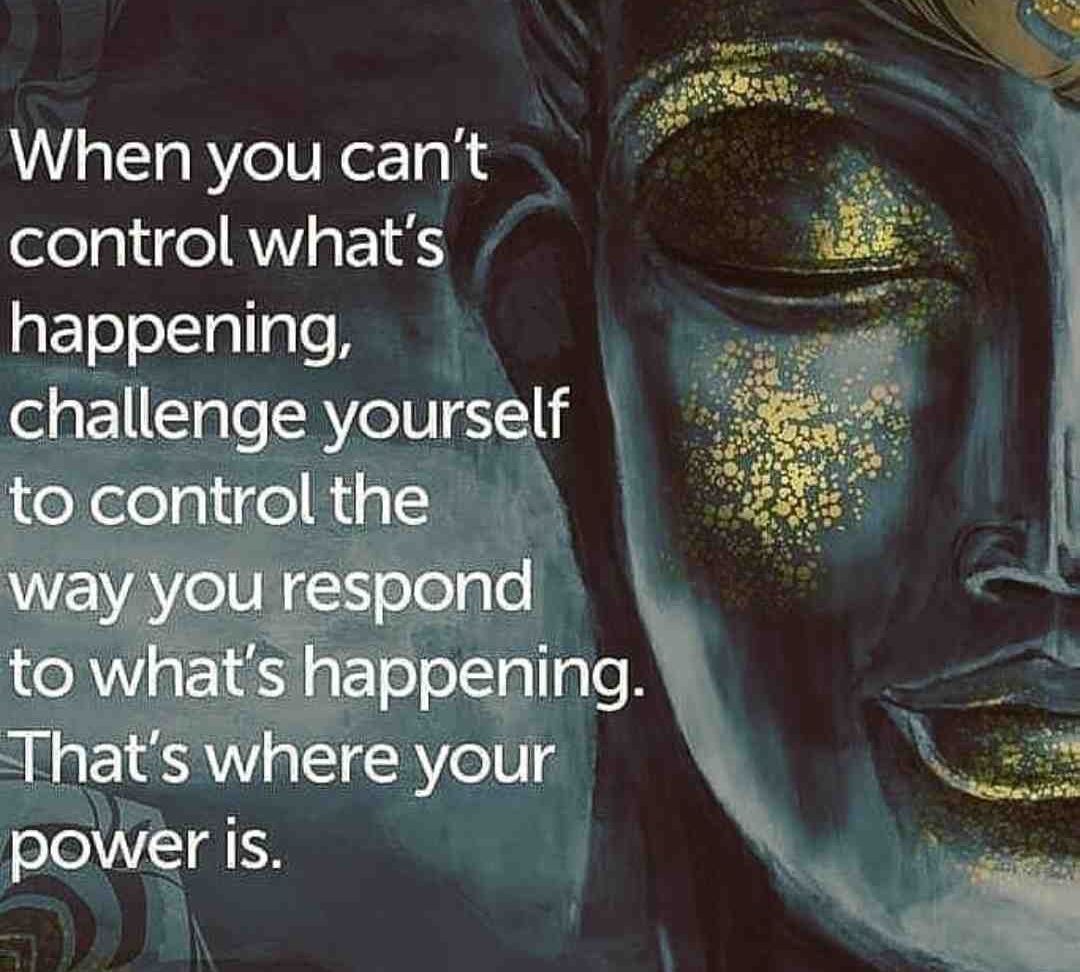 Chaos, Disorder And Decay Is The Natural Order Of Things. Nobody has the perfect life. We all struggle and strive to attain health, wealth and personal happiness. Yet these three big areas: our health…
Chaos, Disorder And Decay Is The Natural Order Of Things. Nobody has the perfect life. We all struggle and strive to attain health, wealth and personal happiness. Yet these three big areas: our health…Intuition Or Anxiety - Are There Angels Or Devils Crawling Here?
 How To Tell The Difference Between Intuition and Anxiety. How do you know whether the voice of your intuition is real or just the product of your inner anxiety? Several months ago I was having a drink…
How To Tell The Difference Between Intuition and Anxiety. How do you know whether the voice of your intuition is real or just the product of your inner anxiety? Several months ago I was having a drink…What Is Truth - How To Tell A Partial Truth From The Whole Truth?
 How the truth and nothing but the truth is often not the whole truth. My great aunty Flo broke her arm and died. It is true that she broke her arm in 1923. It is also true that she died in 1949. But t…
How the truth and nothing but the truth is often not the whole truth. My great aunty Flo broke her arm and died. It is true that she broke her arm in 1923. It is also true that she died in 1949. But t…Duality And Life Beyond Your Thinking Mind
 Duality and life beyond your thinking mind focuses on the limitations of time, foreground and background, duality and "stuckness". The first aspect of duality and life beyond your thinking mind focuse…
Duality and life beyond your thinking mind focuses on the limitations of time, foreground and background, duality and "stuckness". The first aspect of duality and life beyond your thinking mind focuse…The Conscious Mind Is Limited - Be Aware And Be Prepared
 Being aware is the first stage of being prepared. The conscious mind is limited in so many ways. There are some who would argue that there is no such thing as conscious thought and that it is represen…
Being aware is the first stage of being prepared. The conscious mind is limited in so many ways. There are some who would argue that there is no such thing as conscious thought and that it is represen…Your Inner Map Of Reality - Here's Why You Think The Way You Do
 The big picture of how your inner map of reality creates your feelings, thoughts, and behaviours. Your inner map of reality is based on the filters of your own ethnic, national, social, family and rel…
The big picture of how your inner map of reality creates your feelings, thoughts, and behaviours. Your inner map of reality is based on the filters of your own ethnic, national, social, family and rel…The Failure Of Cancel Culture - Suppression Not Engagement
 Why we need to wear our beliefs lightly and develop negative capability. Throughout history people have campaigned to fight beliefs, ideologies, and injustices that they perceived to be oppressive, di…
Why we need to wear our beliefs lightly and develop negative capability. Throughout history people have campaigned to fight beliefs, ideologies, and injustices that they perceived to be oppressive, di…4 Big Reasons Why We Get Stuck In Our Attempts At Personal Change
 Most People Spend Their Entire Life Imprisoned Within The Confines Of Their Own Thoughts. This first of the 4 big reasons why we get stuck is, in my view, the most important. The "self-help industry…
Most People Spend Their Entire Life Imprisoned Within The Confines Of Their Own Thoughts. This first of the 4 big reasons why we get stuck is, in my view, the most important. The "self-help industry…How Do I Change And Why Is It So Hard?
 We Would Rather Die Than Change, And We Usually Do In my experience, the vast majority of people who say they want to change don’t change. Most people reading this won’t change because they don’t real…
We Would Rather Die Than Change, And We Usually Do In my experience, the vast majority of people who say they want to change don’t change. Most people reading this won’t change because they don’t real…The Illusion Of A Separate Self - Windows 11 With Self Awareness!
 Beyond the content of your mind you are so much more than you think you are. When we talk of "myself" this is the conventional way of referring to our self image which is in fact the ego's constructio…
Beyond the content of your mind you are so much more than you think you are. When we talk of "myself" this is the conventional way of referring to our self image which is in fact the ego's constructio…

